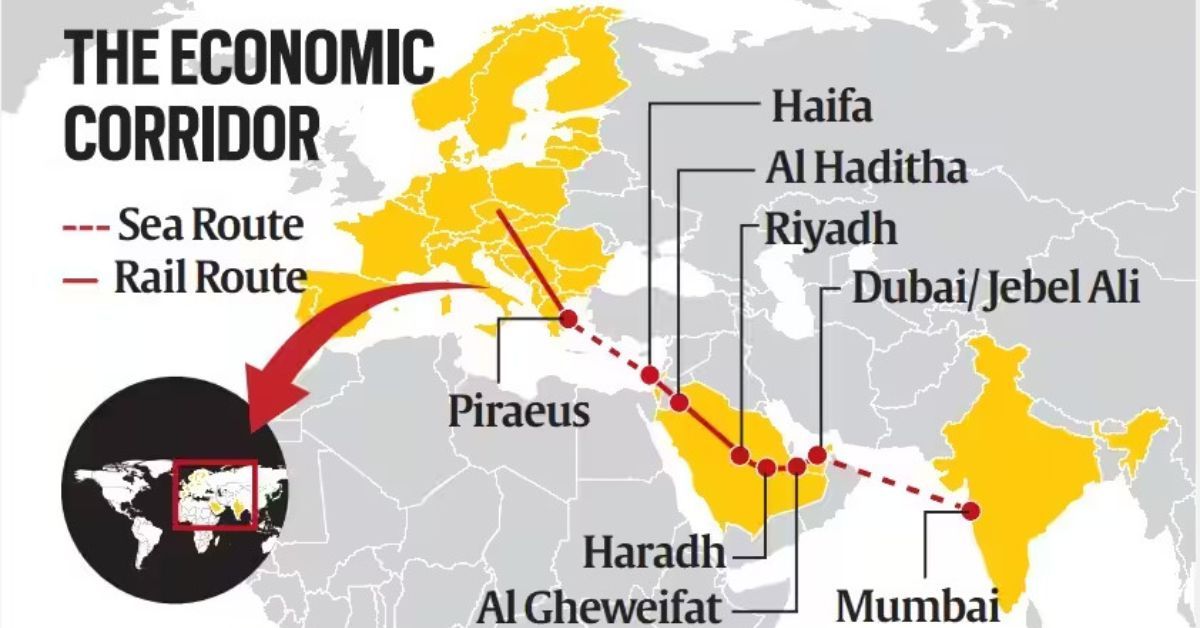Amid global shockwaves over the ongoing violence in Palestine and Israel, Union Finance Minister Nirmala Sitharaman said on Wednesday that the India-Middle East-Europe Economic Corridor (IMEC), announced at the New Delhi Group of Twenty summit, faces geopolitical challenges in the current conflict.
“IMEC will be a win-win situation for all states involved as it enhances transportation efficiency, reduces logistic costs, increases economic unity, generates employment, and lowers greenhouse gas emissions, contributing to a cleaner, safer, better world. However, it is not without its geopolitical challenges, and the ongoing conflict in Israel and Gaza is a worrying manifestation of these,” the finance minister said at the Indo-Pacific Regional Dialogue 2023.
These are among the first comments by a senior Indian government official on the likely impact of the Israel-Hamas war. The ambitious multi-country corridor was announced in September, and plans are afoot to identify optimal connectivity by the central government, which will play a major role in executing the Eastern corridor, establishing connectivity between West Asia and India. The corridor, encompassing transportation, electricity cables, high-speed data cables, and a hydrogen pipeline, faces uncertainties following recent tensions in West Asia due to terrorist attacks in Israel and subsequent Israel-led attacks in Gaza, impacting stability in the region and raising questions about the corridor.
IMEC aims to connect Indian ports such as Jawaharlal Nehru Port Trust, Mundra (Gujarat), and Kandla (Gujarat), with West Asian ports like Fujairah, Jebel Ali, and Abu Dhabi in the United Arab Emirates, as well as Saudi Arabian ports of Dammam, Ras Al-Khair, and Ghuwaifat.
A rail segment will extend the IMEC, providing connection to Saudi Arabia and the Port of Haifa in Israel. A maritime route will then link Haifa to the Greek port of Piraeus, establishing connectivity to Europe.
India-based P&I entity
Over the past three years, Indian traders and logistics players have faced numerous supply shocks due to Covid-19 and geopolitical tensions.
Sitharaman highlighted that maritime manifestations of Covid-19 have made shipping insurance a major policy focus in the discourse on the blue economy. “To reduce India’s vulnerability to international sanctions and pressures and to provide greater strategic flexibility in shipping operations, we are setting up a full-fledged Indian-owned and India-based protection and indemnity (P&I) entity that will additionally provide protection to coastal and inland shipping,” Sitharaman said.
The Centre aims to resolve insurance issues for domestic shippers and reduce India’s logistics costs through this move. Past incidents, such as the impact on oil supply from Russia during the Russia-Ukraine war, underscore the importance of such measures.
Moreover, the Centre has identified coastal shipping as a cost-effective mode of goods transportation in the country. However, the shipping industry awaits adequate financial and infrastructural incentives to fully embrace this initiative. While the 2023-24 Budget contains a provision for viability gap funding in the coastal sector, no significant progress has been made on this front nine months into the Budget.
Despite geopolitical shocks, including recent ones in Israel and Yemen, the Indian economy has stood out as a bright spot, according to Sitharaman. She emphasised that India aims to shoulder greater regional responsibility in the Indo-Pacific going forward. “We are very clear that we cannot afford to be an inward-leaning power. Our focus on transitioning from a ‘brown’ economic model into a ‘blue’ one and extrapolating this blue transition across the Indo-Pacific demands that we shoulder greater and heavier regional responsibilities, and this is precisely what we are doing,” Sitharaman said. The minister added that the Indo-Pacific finds itself in the middle of two competing systems, and middle powers are exploring options for engagement that provide assurance of the peaceful pursuit of geoeconomic goals in line with individual national interests and broader regional ones.








